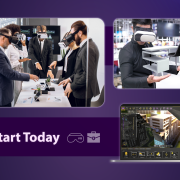As virtual reality (VR) technology matures, businesses of all sizes are exploring its potential to enhance their operations, improve customer experiences, and drive innovation. However, scaling VR solutions presents unique challenges, especially when catering to the distinct needs of startups and large enterprises with varying budgets and expectations. In this blog, we will discuss the challenges of scaling VR solutions for different company sizes and explore how platforms like Unity, Unreal Engine, and SimLab can provide tailored solutions that meet the diverse needs of both small and large businesses.

The Challenges of Scaling VR Solutions
- Diverse Needs and Expectations:
Startups often have limited resources and require solutions that can deliver quick results with minimal investment. Conversely, larger enterprises may have more complex requirements, seeking comprehensive VR systems that integrate with existing infrastructure and scale across departments. - Budget Constraints:
Smaller companies typically operate with tighter budgets, making it essential to find cost-effective solutions that don’t compromise on quality. Meanwhile, large enterprises may have more significant financial resources but require justifications for their investments to ensure alignment with strategic goals. - Technical Complexity:
The technical challenges associated with VR development can be daunting for businesses, especially those without a dedicated team of developers. Tailoring solutions to meet the specific needs of different organizations requires flexibility and adaptability from VR platforms.

Solutions for Scaling VR Solutions
- Unity’s Scalability:
Unity is renowned for its scalability, making it an ideal choice for companies of all sizes. The platform allows developers to create VR experiences that can be easily expanded or modified based on evolving business needs. Its asset store provides access to a wide range of tools and assets, enabling smaller companies to build quality VR solutions without incurring high costs. For larger enterprises, Unity offers advanced features and integrations that facilitate complex projects, allowing teams to collaborate efficiently across different departments. - Unreal Engine’s Flexibility:
Unreal Engine stands out for its flexibility in developing immersive VR experiences. Its powerful rendering capabilities and visual scripting system, Blueprints, enable developers to create highly customizable solutions that cater to the specific requirements of any organization. This flexibility allows both startups and large enterprises to craft unique VR applications tailored to their goals, whether it’s for training, marketing, or product visualization. - SimLab’s Budget-Friendly Tools for Smaller Businesses:
SimLab stands out as a specialized platform focused on creating high-quality VR experiences tailored to serious applications like training, education, and healthcare. Designed as a no-code solution, SimLab makes VR development accessible without requiring extensive technical expertise, enabling companies to integrate VR across multiple devices with minimal setup. Its fast learning curve empowers teams to produce immersive content quickly and easily, regardless of their background. Always on the cutting edge, SimLab stays current with industry trends and new devices, including recent innovations like ChatGPT integration for interactive, AI-driven VR experiences. These features make SimLab an ideal, budget-friendly choice for both startups and established enterprises seeking efficient VR solutions that adapt to diverse organizational needs.

Conclusion
Scaling VR solutions effectively requires a strategic approach that acknowledges the unique challenges faced by both small startups and large enterprises. By utilizing platforms like Unity, Unreal Engine, and SimLab, businesses can access the flexibility and scalability necessary to meet their specific needs and budgets. As the demand for VR technology continues to grow, adopting tailored solutions will be key to unlocking the full potential of virtual reality across diverse organizational landscapes.
References
- Unity Technologies. (n.d.). Unity: Scalable Solutions for All Business Sizes. Retrieved from Unity
- Epic Games. (n.d.). Unreal Engine Documentation: Scalability and Performance. Retrieved from Unreal Engine Scalability
- SimLab. (n.d.). SimLab Solutions: Affordable VR Tools for Small Businesses. Retrieved from SimLab Solutions
-

1 Talent Retention and High Turnover: Building Sustainable Teams in the VR Industry
-

2 Security Concerns in VR: Safeguarding Data and Intellectual Property
-

3 Integration with Existing Tools: A Seamless Workflow for VR Service Providers
-

4 Content Creation Struggles: Balancing Quality and Time in VR/AR Projects
-

5 Unleashing Your VR business with SimLab VR Platform

